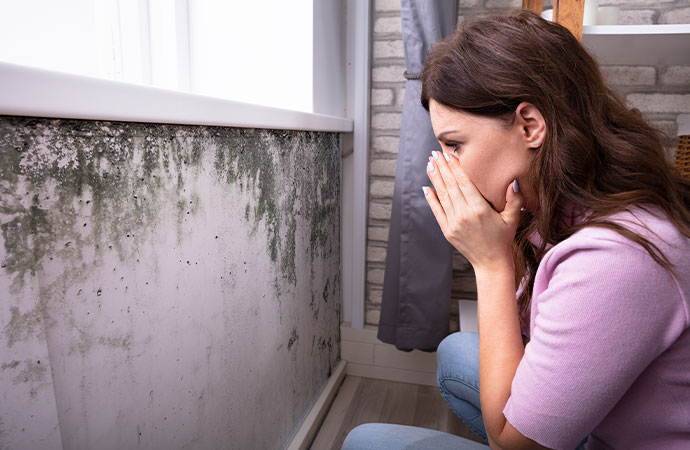“Following a devastating fire, Dayspring’s ability to pull resources from all over the state within hours was incredible. They had over 50 workers onsite within 2-3 hours! We would never have been able to have our students back in school within 2 days were it not for the quick response and the quality of work provided by them. Their quality of work was excellent!”
What Are the Long-Term Side Effects of Mold Exposure?
You probably know that having mold in your home is bad for you. However, you might not know just how bad it can be for your health – and for your house. The long-term effects of mold on your health can be dangerous and may impact you (and your family) for life. In addition, mold can cause serious damage to your house, potentially leading to the destruction of drywall or to the collapse of a wall.
When you detect mold in your house, it’s important to get professional mold remediation. Otherwise, the mold will likely persist and continue creating problems.

Health Effects
As mold grows, it typically gives off two substances that can cause health problems: spores and volatile organic compounds (VOCs). Spores are similar to seeds, in that they can grow into new mold, but they are also similar to pollen in the way that they can irritate the body. VOCs are chemicals that give mold its characteristic smell, but can also be toxic, similar to VOCs that might be emitted by paints or by smoke residue after a fire.
Allergic Response
The most common harmful response from mold exposure is an allergic reaction. Many people either have or develop an allergy to mold. An allergic response is when your immune system responds to something that represents either no danger or minimal danger as if it were a serious threat.
Some of the common symptoms of an allergic response to mold are:
- Runny nose
- Congestion
- Coughing
- Sneezing
- Eye irritation
- Sore throat
- Skin rash
- Headaches
Immune System Changes
Since an allergic response is related to your immune system, it should be no surprise that prolonged exposure to mold can result in changes to your immune system. The most common response is systemic inflammation, which can have a wide range of potential health effects. There is even the potential risk of developing an autoimmune disorder because of prolonged immune system activation.
Fungal Infection
On the other hand, when people don’t have a strong immune system, such as people who have a compromised or suppressed immune system, there’s a risk of fungal infection. A fungal infection occurs when fungus starts growing inside your body, and it can be dangerous, even deadly.
If you have a weak immune system, you need to be very cautious about exposure to household mold.
Respiratory Distress
For some people, exposure to mold can affect their breathing. This most often occurs because of asthma, in which your airways are swollen or otherwise narrowed, leading to breathing difficulties. Asthma related to mold exposure is typically worse in children, but it can affect people of all ages.
Cognitive Effects
Mold can even affect a person’s ability to think. Mold exposure has been linked to lightheadedness, dizziness, blurred vision, difficulty thinking, and problems with short-term memory.
House Effects
In addition to your health, letting mold grow in your house can lead to significant damage to your home. The cost of this damage can be much higher than the cost of professional mold remediation.
Damage to Wood Structure
Common house molds feed on cellulose. Cellulose is one of the main components in wood, part of its structure that makes it strong. As mold eats away the cellulose, wood studs and beams can grow weaker, increasing the risk that your house might collapse under its own weight or under the weight of snow.
Destruction of Drywall
Another place where your house might have a lot of cellulose that mold can attack is in your drywall. Drywall is a sheet of gypsum wrapped in paper. When mold grows on drywall, it attacks the paper wrapping. This can make the drywall more likely to collapse.
Loss of Property Value
The presence of mold makes your house much less desirable on the sales market. Many potential buyers will shy away from the property because of the risks related to mold. Others may want to see the price reduced because they expect to have to get professional mold remediation. Not knowing how bad the mold problem is, they might ask for a price reduction to cover the worst-case scenario, which might be significantly more than the actual cost of mold remediation, especially if you get it done early.
Let Dayspring Restoration Help with Your Mold Problem
Let Dayspring Restoration Help with Your Mold Problem If you have mold growing in your house, don’t risk these potential dangers to your health and home. Instead, let mold remediation experts get rid of the mold.
Dayspring Restoration has been the leading mold remediation provider in the region since 1989, and we’ve helped many people throughout Montana to eliminate mold growth in their home or business. We offer 24/7 emergency response services, which can help not only with the mold growth, but also to counter a water leak that is contributing to mold growth. We can handle every aspect of mold remediation, from tracking down and cutting off the source of water that led to mold growth to finishing touches that erase any visible evidence of the mold. Our meticulous process utilizes the latest best practices in the restoration industry, including advanced technology and techniques that can make it all but impossible for someone to tell where the mold used to be in your house. We also take steps to reduce the recurrence of mold.
If your insurance policy covers damage from mold, we can coordinate with your insurance company to make sure you get compensation in the full amount covered. This eliminates the hassles you’d experience if you have to work directly with your insurance company and make sure everything is documented properly.
To learn more about how Dayspring can help you get rid of mold in Montana, please contact us today.














